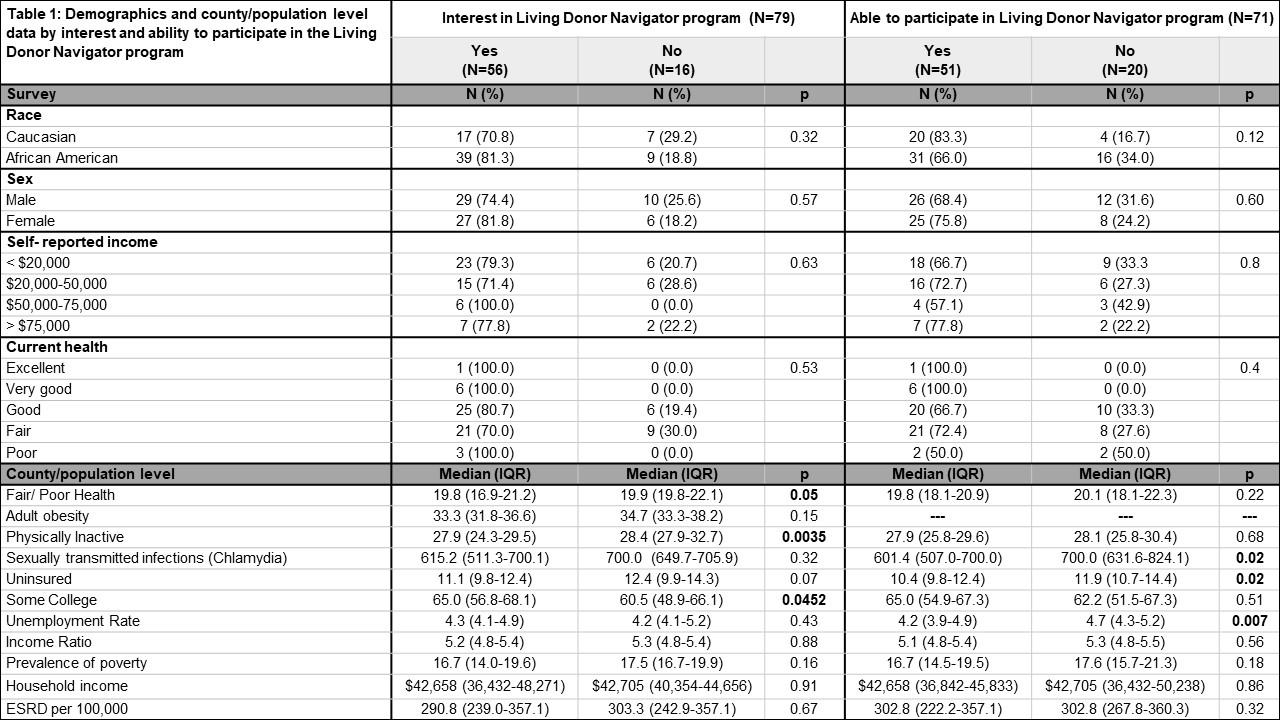Geographical Disparities in Transplantation: Exploring the Association between County Health Rankings and an Individual’s Access to Transplantation
Surgery, University of Alabama at Birmingham, Birmingham, AL
Meeting: 2020 American Transplant Congress
Abstract number: C-243
Keywords: Kidney, Living donor, Patient education, Renal failure
Session Information
Session Name: Poster Session C: Non-Organ Specific: Disparities to Outcome and Access to Healthcare
Session Type: Poster Session
Date: Saturday, May 30, 2020
Session Time: 3:15pm-4:00pm
 Presentation Time: 3:30pm-4:00pm
Presentation Time: 3:30pm-4:00pm
Location: Virtual
*Purpose: Since 2004, living kidney donation has declined, with the southeastern United States disproportionately affected. Programs such as the Living Donor Navigator (LDN), designed to mitigate this decline, have been associated with increases in living donation. To date, however, likelihood of participation in these programs by socioeconomic status (SES) and population health characteristics has not been examined.
*Methods: We distributed 172 surveys to adult kidney-only candidates who initiated evaluation at our center between 8/2019-11/2019 and assessed both their interest in and access to the LDN program. Utilizing nonparametric Wilcoxon rank sums test, chi-square, and Fisher’s exact tests when applicable, we were able to assess geographical barriers, interest, and ability when compared to county health rankings.
*Results: We had a 46% response rate (79/172). The 79 survey respondents represented 6 states and 44 counties within the southeastern United States. Geography proved to be the greatest barrier among disinterested candidates, with candidates who indicated distance as a barrier to participation in the LDN program living approximately 70 miles further from our center as compared to individuals who did not indicate distance as a barrier to participation (Median (IQR) of 127.8 (86.6-169.2) vs. 57.3 (10.8-101.7), p <0.0001, respectively). Additionally, candidates who indicated they would be able to participate in the LDN sessions lived approximately 40 miles closer to our center than those reporting inability to participate (Median (IQR) 83.7 (14.6-141.7) vs. 120.6 (81.4-167.4), p=0.04, respectively). Candidates who were not interested in the program were from areas with higher rates of physical inactivity and lower rates of college education. Further comparisons showed that candidates who were not able to participate were from areas with higher rates of un-insurance and unemployment. Although not significant, the prevalence of poverty was also greater among individuals who indicated their inability to participate in the LDN program (Table 1).
*Conclusions: These data suggest that geography in combination with being from under resourced areas was negatively associated with healthcare engagement. Geography and poverty may be surrogate markers for lower health literacy and fewer healthcare interactions.
To cite this abstract in AMA style:
Carter AJ, Reed RD, Hendricks D, Baldwin KN, Kale AC, Locke JE. Geographical Disparities in Transplantation: Exploring the Association between County Health Rankings and an Individual’s Access to Transplantation [abstract]. Am J Transplant. 2020; 20 (suppl 3). https://atcmeetingabstracts.com/abstract/geographical-disparities-in-transplantation-exploring-the-association-between-county-health-rankings-and-an-individuals-access-to-transplantation/. Accessed July 5, 2025.« Back to 2020 American Transplant Congress

